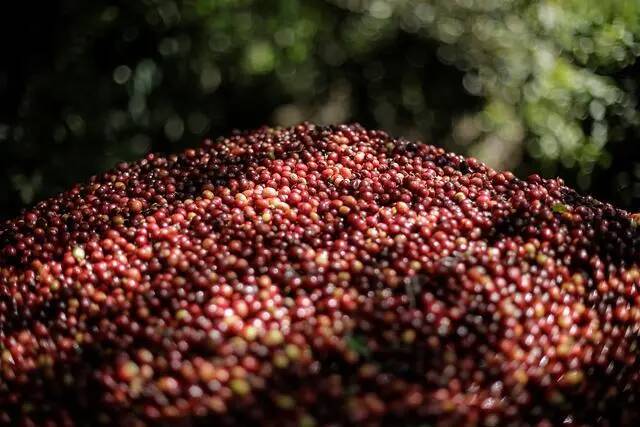The coffee industry in Central American countries has been affected by the continuous weather, and there is a shortage of manpower in many countries, resulting in persistently high coffee prices.
Recently, a number of coffee-producing countries in Central American states have encountered a lot of problems, causing damage to the coffee industry, Reuters reported. Among them, Costa Rica was affected by weather conditions, resulting in a reduction in coffee production due to rainfall. Nicaragua is expected to be affected by El Ni ñ o until mid-May, and the drought is not expected to ease until July to September. There is also a labor shortage. The most serious is Panama, as the Panama Canal crisis remains unresolved, drought continues, and shipping problems have affected the recent rise in coffee prices. In addition, Panamanian workers protested, causing workers to delay coffee harvest.
Costa Rica, according to a recent forecast released by the Costa Rican Coffee Institute ICAFE, due to the recent irregular rainfall in Costa Rica and the lack of labor force, the coffee harvest in Costa Rica in 2023 / 24 is expected to be about 13% lower than that in the 2022 Summer 23 season. Costa Rica is currently facing windy weather and heavy rainfall, and the timing of rain is difficult to predict. Unstable rainfall has affected that coffee trees may blossom prematurely, and too much Rain Water will also bring more microbes. As a result, farmers need to plant more other trees to protect coffee trees from the wind and rain, which also adds to the human burden.

According to the U.S. Department of Agriculture's Foreign Agricultural Service (FAS) report on Costa Rica, the number of Costa Rican coffee farmers is declining. In the past, most of the coffee collection workers were temporary foreign workers from Nicaragua and Panama, but with the changing flow of migrants, a large number of Nicaraguan workers choose to emigrate to the United States or elsewhere. Costa Rica is not chosen, so there is a lack of labour.
Nicaragua according to the climate analysis report released by the Nicaraguan Natural phenomena Observatory (Ofena), the impact of El Ni ñ o on Nicaragua will continue until mid-May, and the drought situation from July to September is expected to improve.

In addition, due to the continued deterioration of the political situation in Nicaragua, the recent number of outbound immigrants is higher than the historical level, and it is estimated that 200000 Nicaraguans choose to emigrate. Many coffee production organizations have expressed concern that a shortage of labor may reduce the quality and quantity of the harvest in 2023.
Panama according to the website of Fortune magazine, the Panama Canal has suffered a drought crisis and will last for several years. Normally, the Panama canal handles about 3% of the world's maritime trade and 46% of containers from northeast Asia to the east coast of the United States. It is also Panama's largest source of income, bringing in $4.3 billion in 2022. At present, the canal can only carry a maximum of 24 ships per day, but it is still below the previous capacity of 38 per day, and it may worsen again in the future, and there is no way to recover quickly in the short term, which may last for several years. At present, other countries are considering other navigation routes, but this will increase the cost and time of transportation. This also leads to the current high price of coffee.
And recently, protests and demonstrations have continued in many parts of Panama. The reason for the demonstration is a previous decision made by the Panamanian government to restart domestic copper operations. The demonstrators were mainly environmentalists and societies, many of whom were workers from coffee farms. The open-pit operation of the copper mine will cause serious damage to the environment. Until mid-December, the Panamanian government ordered Canadian mining company First Quantum Minerals (FM) to suspend operations at its flagship copper mine in the country. But continued protests have delayed the work of Panamanian coffee workers.
Important Notice :
前街咖啡 FrontStreet Coffee has moved to new addredd:
FrontStreet Coffee Address: 315,Donghua East Road,GuangZhou
Tel:020 38364473
- Prev

Introduction to the development history of Vietnamese coffee, Vietnamese coffee producing areas, Vietnamese coffee bean varieties and classical Italian blending.
Vietnam is located at the southeast end of Indo-China Peninsula in Southeast Asia, bordering China, Laos and Cambodia, and bordering the South China Sea to the southeast. The topography of Vietnam is narrow and long, slightly S-shaped. The topography is high in the northwest and low in the southeast, and the territory is composed of mountains and plateaus. The central Changshan Mountains run from north to south. Vietnam is located in the south of the Tropic of Cancer and belongs to tropical monsoon.
- Next

What's the smell of white flowers in the coffee? How does the hand-brewed coffee smell like flowers?
When we buy coffee beans, we can see attractive flower fragrance descriptions on the labels of some beans, and one will buy them directly if we can't help it. But when it is finished, when it comes to tasting and drinking, this often happens: "where is the scent of flowers? where is the scent of my flowers? why can't I drink it?"
Related
- What grade does Jamaica Blue Mountain No. 1 coffee belong to and how to drink it better? What is the highest grade of Blue Mountain coffee for coffee aristocrats?
- What are the flavor characteristics of the world-famous coffee Blue Mountain No. 1 Golden Mantelin? What are the characteristics of deep-roasted bitter coffee?
- Can I make coffee a second time in an Italian hand-brewed mocha pot? Why can't coffee be brewed several times like tea leaves?
- Hand-brewed coffee flows with a knife and a tornado. How to brew it? What is the proportion of grinding water and water temperature divided into?
- What is the difference between Indonesian Sumatra Mantinin coffee and gold Mantinin? How to distinguish between real and fake golden Mantelin coffee?
- What does bypass mean in coffee? Why can hand-brewed coffee and water make it better?
- Unexpected! Ruixing Telunsu lattes use a smoothie machine to foam milk?!
- % Arabia's first store in Henan opens into the village?! Netizen: Thought it was P's
- Does an authentic standard mocha coffee recipe use chocolate sauce or powder? Mocha Latte/Dirty Coffee/Salty Mocha Coffee Recipe Share!
- What is the difference between Vietnam egg coffee and Norway egg coffee? Hand-brewed single product coffee filter paper filter cloth filter flat solution!

